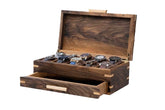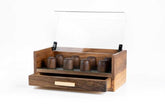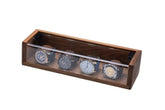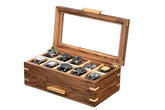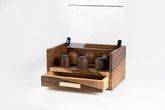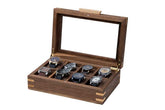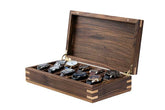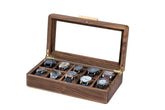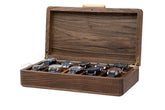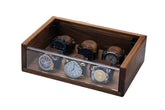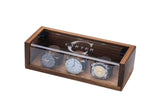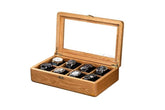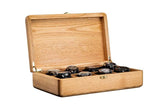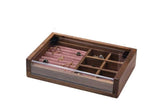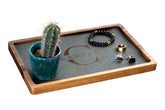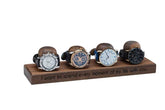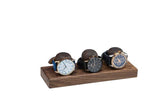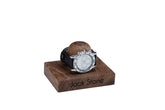In this section, we will explore the unique qualities of Chesnut Wood and its diverse applications in furniture, flooring, and cabinetry. When we are making a handmade watch box, we are using Chesnut Wood. Because of that, we want to look into Chesnut wood.
Key Takeaways:
- Chesnut Wood is a hardwood renowned for its durability and strength.
- It is commonly used in the manufacturing of furniture, flooring, and cabinetry.
- Chesnut Wood is highly valued for its aesthetic appeal and longevity.
- The limited availability of Chesnut Wood contributes to its expensive price.
- Its warm reddish-brown color adds elegance to any space.
What is Chesnut Wood?
Chesnut Wood, also known as Chestnut Wood, is derived from the chestnut tree, which belongs to the Castanea genus. It is a hardwood renowned for its durability, strength, and distinctive grain pattern.
Where is Chesnut Wood used?
Chesnut Wood, renowned for its versatility, finds its application in various industries. This exceptional hardwood is a popular choice in the manufacturing of:
Furniture
Due to its durability and distinctive grain pattern, Chesnut Wood is widely used in crafting high-quality furniture. From elegant dining tables to sturdy chairs, this wood adds a touch of natural beauty to any living space.
Flooring
Chesnut Wood's strength and resistance to wear make it an excellent choice for solid wood flooring. Its warm reddish-brown color and unique grain patterns create a timeless and inviting atmosphere in homes and commercial spaces.
Cabinetry
The versatility of Chesnut Wood extends to cabinetry, where it is valued for its strength and aesthetic appeal. From kitchen cabinets to bathroom vanities, this wood adds a touch of elegance and sophistication to any room.
Watch Box
A chesnut watch box is not only a stylish accessory but also a secure storage solution for valuable timepieces. Walnut Wood offers a luxurious and protective environment, preserving the beauty and functionality of watches.
Personalized Walnut Watch Storage Stand, Engraved Watch Holder, Mens Watch Box, Watch Display Case
Interior Trim Work
Chesnut Wood's rich color and natural beauty make it a sought-after choice for interior trim work. From baseboards to crown moldings, this wood enhances the overall visual appeal of a room, adding a touch of warmth and character.
"Chesnut Wood offers both durability and beauty, making it an appealing choice for furniture, flooring, cabinetry, and interior trim work." - Interior Design Magazine
In addition to these industries, Chesnut Wood is also used in:
- Boat construction
- Barrel making
- Railway sleeper production
|
Industry |
Applications |
|
Furniture |
Dining tables, chairs, cabinets |
|
Flooring |
Wood flooring |
|
Cabinetry |
Kitchen cabinets, bathroom vanities |
|
Interior Trim Work |
Baseboards, crown moldings |
|
Boat Construction |
Boat building, decks |
|
Barrel Making |
Wine barrels, whiskey barrels |
|
Railway Sleepers |
Railroad ties |
Is Chesnut wood good quality?
Chesnut Wood, a hardwood derived from the chestnut tree, is widely regarded for its excellent quality. Its natural characteristics contribute to its reputation as a top-tier timber in various industries, including furniture making, flooring, and cabinetry.
One of the standout qualities of Chesnut Wood is its hardness, which lends it exceptional durability and strength. This makes it highly suitable for items that need to withstand heavy use and constant wear. Whether it's a dining table, a bookshelf, or a sturdy flooring option, Chesnut Wood is up to the task.
Another factor that contributes to Chesnut Wood's exceptional quality is its resistance to decay. This makes it a reliable choice for both indoor and outdoor applications. Furniture made from Chesnut Wood can withstand the test of time, lasting for generations with proper care and maintenance.
When it comes to creating long-lasting wooden items, quality is of utmost importance, and Chesnut Wood delivers on that front. Its inherent properties and structural integrity ensure that you're investing in a material that will stand strong for years to come.
Why is Chesnut wood so expensive?
The limited availability of Chesnut Wood plays a significant role in its expensive price tag. The chestnut blight, caused by a fungal pathogen, has severely reduced the population of the American chestnut tree, making it a rare and sought-after wood.
What is Chesnut wood used for?
Chesnut Wood, appreciated for its stunning appearance and long-lasting durability, finds widespread use in various applications. Its versatility makes it a preferred choice in the manufacturing of high-quality furniture, solid wood flooring, and cabinetry. Moreover, Chesnut Wood is often utilized to create exquisite decorative items such as wall paneling and moldings.
In the realm of furniture, Chesnut Wood's sturdiness and rich aesthetic make it a top pick for crafting timeless pieces that showcase both beauty and strength. From classic dining tables to intricately designed cabinets, Chesnut Wood can elevate the appeal of any interior design.
When it comes to flooring, Chesnut Wood's natural durability and ability to withstand wear and tear make it an excellent choice. Its warm hues bring warmth and character to a space, creating a welcoming atmosphere.
Cabinetry is another area where Chesnut Wood excels. Its sturdiness makes it highly suitable for building durable cabinets that can withstand daily use. The natural beauty of Chesnut Wood also adds a touch of sophistication to kitchen and bathroom cabinets.
With its versatility and aesthetic appeal, Chesnut Wood is a popular choice for decorative items. Wall paneling and moldings made from Chesnut Wood provide a luxurious and refined finish to any room, be it in residential or commercial spaces.
What color is Chesnut Wood?
Chesnut Wood is known for its beautiful color, which adds warmth and elegance to any space. The wood typically exhibits a rich reddish-brown hue, creating a sense of coziness and sophistication. The deep tones of Chesnut Wood make it a popular choice for furniture, flooring, and cabinetry, as it adds a timeless and luxurious appeal to the interior.
However, it's important to note that Chesnut Wood can also display variations in color. Factors such as the age of the wood and the treatment it has undergone can influence its shade. From light to dark brown, Chesnut Wood offers a range of colors that can be tailored to suit different design preferences and aesthetics.
Whether you're seeking a classic, reddish-brown look or a lighter, more contemporary tone, Chesnut Wood can be customized to meet your specific requirements. Its natural beauty and versatile color variations make it a sought-after choice for those looking to create a warm and inviting atmosphere.
Is Chesnut a hard or soft wood?
When it comes to categorizing wood types, Chesnut Wood falls under the classification of hardwood. Hardwoods, including Chesnut Wood, are known for their dense composition and durability, making them highly suitable for various applications that require strength and longevity.
Compared to softwoods like pine or cedar, Chesnut Wood offers a higher level of hardness and resilience. This makes it a preferred choice for structural projects and furniture manufacturing where sturdiness is a key consideration.
Chesnut Wood's hardness and density contribute to its exceptional durability, ensuring that items made from this hardwood can withstand wear and tear over time. Whether it's a solid dining table or a robust bookshelf, Chesnut Wood provides the strength needed to withstand daily use and retain its aesthetic appeal for years to come.
Additionally, Chesnut Wood's hardness makes it resistant to dents and scratches, making it an ideal choice for flooring options that can withstand heavy foot traffic without losing their beauty.
Overall, Chesnut Wood's classification as a hardwood underscores its superior strength and durability, making it an excellent choice for a wide range of applications in construction, furniture production, and interior design.
Is Chesnut Wood strong?
When it comes to strength, Chesnut Wood stands out as a formidable choice. This hardwood possesses impressive structural properties that make it highly suitable for construction purposes. Whether it's used in building robust furniture pieces or sturdy flooring, Chesnut Wood is known for its ability to withstand heavy loads and resist wear and tear.
One of the key factors contributing to the strength of Chesnut Wood is its dense composition. As a hardwood, it has a tightly packed cellular structure that adds to its durability and resistance against damage. This inherent strength makes Chesnut Wood an ideal material for areas that require long-lasting stability, such as bridges, support beams, and outdoor structures.
Additionally, Chesnut Wood's natural resistance to decay further enhances its overall strength and durability. The wood's high tannin content acts as a deterrent to fungal growth and insect infestations, reducing the risk of structural deterioration over time. This quality also makes Chesnut Wood a reliable choice for outdoor applications, where exposure to moisture and environmental elements can pose a threat to weaker materials.
Overall, Chesnut Wood's strength properties make it a versatile and reliable option for various construction projects. Its ability to withstand heavy use and maintain its structural integrity sets it apart as a hardwood that can stand the test of time.
Conclusion
Chesnut Wood, with its unique qualities and versatile applications, remains a prized lumber choice for craftsmen and designers alike. Its exquisite beauty, durability, and exceptional strength make it an ideal option for creating timeless furniture, exquisite flooring, and other exquisite wooden creations.
Whether used in elegant cabinetry, stunning interior trim work, or even the construction of boats and railway sleepers, Chesnut Wood's natural elegance and renowned resilience stand the test of time. Its warm reddish-brown color adds a touch of sophistication to any space, creating a warm and inviting ambiance.
In addition to its visually appealing aesthetics, Chesnut Wood's remarkable hardness and resistance to decay contribute to its unmatched durability. With proper care, furniture and other items made from Chesnut Wood can easily become cherished heirlooms, passed down through generations.
From the distinctive grain pattern to the structural integrity it offers, Chesnut Wood continues to capture the hearts of craftsmen, designers, and homeowners. As a resplendent fusion of natural beauty and enduring strength, Chesnut Wood is the perfect choice for those seeking exceptional quality and timeless elegance in their wooden creations.

